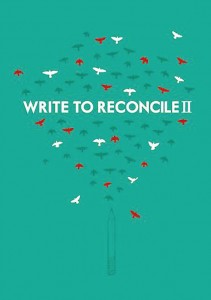Understanding the ‘war years’ through empathy
Teaching creative writing can be in equal parts exhausting and inspiring, just ask Shyam Selvadurai. ‘Write to Reconcile’, the programme he founded with sponsorship from the Royal Norwegian Embassy and the American Centre, is in its second year, and Selvadurai has his hands full. As is now tradition, the creative writing workshops and online forums culminate in an anthology which will be launched this

Shyam Selvadurai Pic by Mark Raynes Roberts
week.Simultaneously, the programme has resulted in encounters that serve both as inspirations and challenges to Selvadurai’s own writing.
The collection consists of the work of young writers from across the island, all of whom are bound by a shared conviction that writing is apowerful tool for reconciliation.Selvadurai knows this is the case because the selection process he designed is not meant to identify those who necessarily have mastery of the English language or have published work to their credit – instead he tells the Sunday Times that he is looking for people capable of great empathy.
In his introduction he writes about how this manifests in a multiplicity of perspectives and an inhabiting of the other through an exercise of literary imagination: Tamil participants write from the point of view of an ex-Sinhalese soldier settled in the Vanni, or of a Muslim family whose son was abducted by the LTTE; Sinhalese participants slip into the lives of a violated Tamil girl who finds refuge in a convent, or a young woman conscripted by the LTTE; a Muslim participant sees the points of view of an LTTE soldier and a Sinhalese medical student. ‘Their work tells us that empathy is possible,’ writes Selvadurai,‘that it is possible to regard the other as one regards oneself. They invite the reader to feel a similar empathy.’
This undertaking lies at the very heart of what ‘Write to Reconcile’ aims to achieve. This year’s anthology is the flowering of work undertaken throughout the last year. It began with an 8-day creative residential writing workshop that was held partly in Kandy and partly in Batticaloa, as well as two creative writing online forums. Participants generated content over the period even as they were taught the basic tools and techniques of writing and editing. Adding value to the process were film screenings, visits from local human rights workers and field visits to people and communities affected by the war. Combined, they have inspired Selvadurai and his protégés to produce a brand new collection of writing on Sri Lanka.
 Selvadurai has long sought to examine the civil war from many different points of view. He says that the first edition of ‘Write to Reconcile’ was missing perspectives of Sri Lankan soldiers and their families as well as writing from the island’s east coast. It’s something he’s sought to remedy with this collection, though he is aware of the gaps that remain in representation. “My ultimate goal for the project is to produce a body of work from which one can make a single anthology of pieces that will give a sense of how the civil war took place across all boundaries – how it affected all Sri Lankans,” he says.
Selvadurai has long sought to examine the civil war from many different points of view. He says that the first edition of ‘Write to Reconcile’ was missing perspectives of Sri Lankan soldiers and their families as well as writing from the island’s east coast. It’s something he’s sought to remedy with this collection, though he is aware of the gaps that remain in representation. “My ultimate goal for the project is to produce a body of work from which one can make a single anthology of pieces that will give a sense of how the civil war took place across all boundaries – how it affected all Sri Lankans,” he says.
Selvadurai is very conscious of the privilege he has in being involved with this work. “I think I’m very lucky because I think most Sri Lankans live in their little pockets – be it class or ethnicity – and we really never get to venture out of it. For me particularly because the work of the writer is so isolated, this is a great opportunity to reach out and to see what young people think and how they see the world. It’s really expanded for me the sense of what it means to be Sri Lankan.”
Following the publication of ‘The Hungry Ghosts’ in 2013, he is now hard at work on his next novel. He says the book abandons the contemporary context for a historical one, but will continue his long engagement with Sri Lanka. “I find that I can’t do these contemporary novels all the time, I find them excruciating,” he confesses, blaming the need to sort through a “barrage of information” as he whittles it all down to what he calls a “narrative of metaphor.”
Still, his work on ‘Write to Reconcile’ has impacted him in a significant way, one which his readers will likely discover when he is ready to publish his new novel. Selvadurai identifies the change as a new found confidence in being able to inhabit a point of view very different from his own. His love for his subject of long standing – “the Colombo 7 world” – remains unchallenged. The author understands its nuances, its complexities and the relationships between the various ethnicities; a deep familiarity which he lacked with say the world of Jaffna during the war. Now that has changed.
“I would be able to now, as with my work on the Colombo 7 crowd, be able to draw on individual’s stories, the very particularities of that to create a convincing narrative.” His criticism of writers both local and belonging to the diaspora is that they tend to “generalise rather than particularize,” resorting to stereotypes. His own instincts would have him take the opposite path, and ‘Write to Reconcile’ has been key to this. “It comes from the participants. They trust me, they invite me to their houses, they don’t talk as in confessing their stories as much as they just talk to me,” he says.
Together, he thinks this new generation of writers have a goal, to convey the tragedies of the civil war and the violence of the decades before it, keeping in mind the lessons of writers who have grappled with the holocaust. “The best holocaust literature is very personal and very small and it is in that smallness that we as the outsiders, get a sense of the horrendousness of the larger thing,” says Selvadurai, offering a cautionary counterbalance:“If we go as do Hollywood films for the shock value, then we are missing the human aspect and I think it is those stories that will ultimately make us understand what has happened in this country.”
Find more information on the project online: writetoreconcile.com or email writetoreconcile@gmail.com
The anthology is available for download now.


